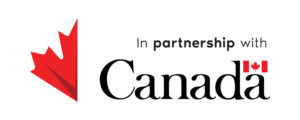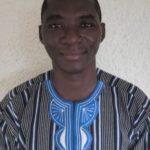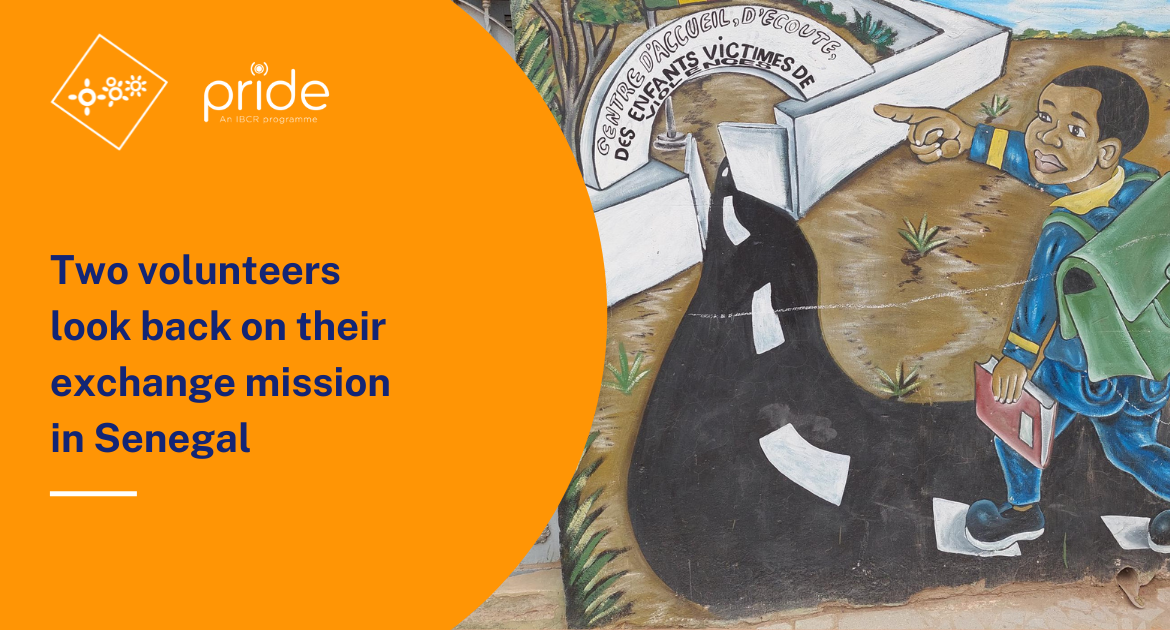
Last July, Flora Ouedraogo, a volunteer organisational management advisor for the AMANE Foundation in Morocco within the framework of our PRIDE project, carried out an exchange mission in Senegal with the NGO EDEN. During her mission, she worked jointly with Goro Palenfo, a volunteer social work advisor also working with the PRIDE. Together, the two volunteers had the opportunity to organise several workshops on mechanisms for the Prevention of sexual abuse and exploitation (PSEA) of children.
Flora and Goro are both Burkinabè nationals, and have completed volunteer assignments in Morocco and Senegal respectively in 2021.
This interview was conducted following their exchange mission.

Can you briefly give us the background of this exchange?
Flora: This exchange was initiated in order to strengthen the knowledge and intervention methods for the Prevention of sexual abuse and exploitation (PSEA) in Morocco, where I am in charge of developing a policy on the subject. It was deemed beneficial for me to go to Senegal to work with the NGO EDEN, which was at the same time working on the organisation’s internal procedures in relation to PSEA.
Goro: Yes, indeed, this mission was an opportunity for the two organisations that work in similar contexts to work together towards building their capacity on the subject.
Do you think that this exchange has been beneficial for both organisations?
Flora: I would say that it has been very beneficial, because it has allowed for the sharing of practices between the two organisations, especially in the area of providing support to child victims of violence. I can already feel the impact on my daily work. I continue to work on the policies of the Amane Foundation and I attach more importance to certain aspects that came out of our discussions, such as the need to train staff on an ongoing basis and also to establish a repertoire of institutions that can be referred to for support for victims of abuse.
Goro: EDEN is an organisation that works a lot on child protection. It is a reference structure that does a lot of things in the field. However, although they accompany children in a formal way, they have not really addressed the issue of prevention of sexual violence and abuse. Flora’s mission made us realise that there is no such thing as zero risk. Something clicked, and EDEN has now launched a review of its intervention policy to better prevent and combat sexual exploitation.
Since the beginning of the PRIDE project in April 2020, more than twenty volunteers have already been deployed in the field with our partners. Because of the health context and the limitations on international travel, the majority of deployed volunteers are so-called “South-South” volunteers like you, i.e. people with the nationality of one of our 11 intervention countries who are going to work in one of the other 10 countries. What added value do you perceive in this type of mandate, compared to traditional mandates in which Canadians are deployed?
Goro: It’s a bit difficult for me to make this comparison because we didn’t have the experience of the classic mandates. On the other hand, I would say that the partner really appreciated receiving a volunteer from the South. Among other things, because there was a similarity in the social, political, cultural, and economic context. In my case, my integration was very easy and quick, and my mandate allowed the structure to better understand the PRIDE rpoject. And if tomorrow the situation changed, and we had Canadian citizens coming, the NGO would be better prepared to receive any type of volunteer.So, there was an added value in having the South-South at the begining of the project.
Flora: Even if my context is different from Goro’s, I would say that it is above all this feeling of belonging to the same community that facilitates the work in the field and a relatively easy adaptation to the cultural context of the countries in which we intervene, even if here I see that there is a difference with West Africa. I can add that this also facilitates capacity building, because the partners find it easier to accept the new practices we propose.
What do you think is the most interesting aspect of South-South cooperation?
Flora: For me, the added value of South-South cooperation is the valorisation of your work and your skills. The Amane Foundation and PRIDE have given me this responsibility, and have allowed me to move forward. For the partner, I think that South-South cooperation with PRIDE is also the recognition at the international level of the impact that this type of programme can have at the community level.
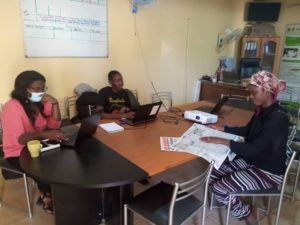
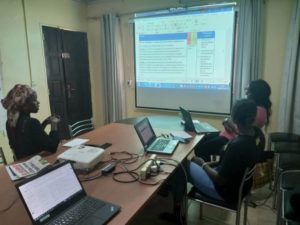
In your opinion, what is the added value of having worked in the framework of PRIDE, and alongside a Canadian organisation? What did it bring to your daily work?
Flora: For me, the added value of having worked with PRIDE is first of all the fact that I take into consideration that all the actions I take will have a long-term effect. So, in everything I do, I have to be able to sustain the actions so that they can have a long-term effect on the protection and promotion of children’s rights. Moreover, working with the IBCR has also enabled me to be more sensitive to the issue of gender equality. Now I really try to take this into account in my work and especially in my studies.
Goro: Prior to my mandate as a PRIDE volunteer, I had worked on the IBCR child protection capacity building project for security forces, justice personnel and social workers in Burkina Faso from 2015 to 2021. Working with IBCR and subsequently PRIDE has been a real learning experience for me. Because beyond the knowledge that we share with colleagues, whether it is in the field or in Montreal, what I appreciated the most was the working method, much more based on participatory techniques. So that led me to change my own approach in order to get messages across, and to better discuss and work together with the partners in the field in order to achieve better results.
What is next for your respective mandates?
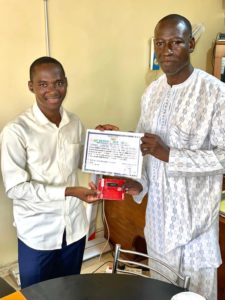
Flora: For me, the next step is to finalise the drafting of a child protection policy, a protection policy against exploitation and forced labour of children and the training of the staff of the AMANE foundation. The volunteering experience is a plus in my professional career, as I was a bit of a novice before I started this mandate. It will definitely help me in my future projects […]. It’s really something that I could put forward and use in my future work when I’m back in my country.
Goro: I have good memories of the collaboration with EDEN, I have also kept good contacts. Even if the documents we worked on together are, for me, the property of the organisation, that doesn’t prevent me, if one day I have to give conferences, from using these documents to support my message. EDEN, through this short collaboration, does not see us as people from the South or from other countries. They see a collaboration between EDEN and IBCR and I think that at the moment they are in a dynamic that should greatly advance the promotion and protection of children.
Are you interested in international volunteering? Find out about our open volunteer cooperation mandates now!
KEEP ME INFORMED OF UPCOMING VOLUNTEERING OPPORTUNITIES
KEEP ME INFORMED ON UPCOMING VOLUNTEERING OPPORTUNITIES
